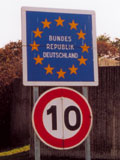Immigration to Germany

There has always been immigration to Germany. The reasons for doing so have varied throughout the ages. Some came as workers or traders, others as refugees. One of the most well known and largest immigrant groups in German history were the "Huguenots", a persecuted religious community who fled France in the 17th century. Another grouping in the 19th century were the so-called "Ruhr Poles": immigrants of Polish background who worked mainly in the coal mines in the Ruhr Basin, many of whom stayed and settled in Germany.
Since the end of the 1950s, many different immigrants came to work in post-war Germany as a result of special agreements (so called "Anwerbe-Abkommen"). West Germany experienced the "Wirtschaftswunder" (the post-war economic boom) and workers were needed to keep the factories running. Agreements for workers were signed with Italy, Turkey, Yugoslavia and Morocco among others. In the GDR, workers from Vietnam and African states were invited to come. When travel restrictions were eased after the fall of the Iron Curtain at the end of the 1980s, many ethnic Germans ("Aussiedler") returned, mostly from former Eastern Bloc countries. Between 1990 and 2000, more than 2 million "Aussiedler" came to Germany. Another large immigrant group are the politically persecuted and refugees of war.
Today, more than 7 million foreigners live in Germany, almost 9 per cent of the population. One quarter were born in Germany. The majority of foreigners live in the former West Germany and most have been there for ten years or more.
Each year around 800,000 people move to Germany and almost 700,000 emigrate. Some stay for a short time, others for life. Germany is described as a country of immigration ("Einwanderungsgesellschaft"). Immigrants and their children influence part of the cultural and public life.
Numerous firms have been founded by immigrants and their business activities comprise much more than the ubiquitous restaurants which can be seen everywhere. Immigrants have an ever-growing representation in the service sector and the commercial economy.
Many immigrants are also actively involved in trade unions. The number of people of non-German origin active in politics, communal parliaments, state parliaments and the Bundestag (the German parliament), is, however, relatively small.
